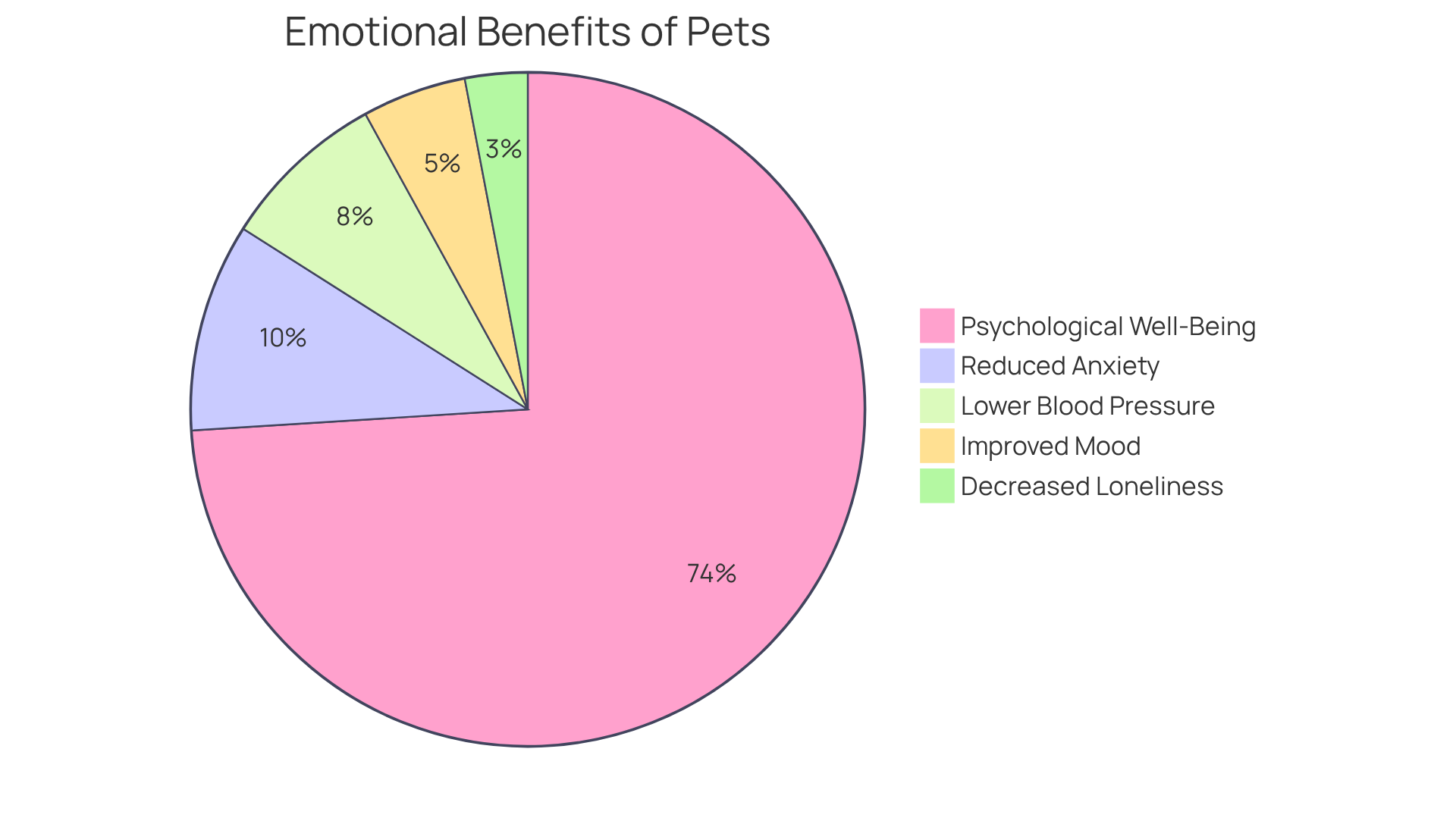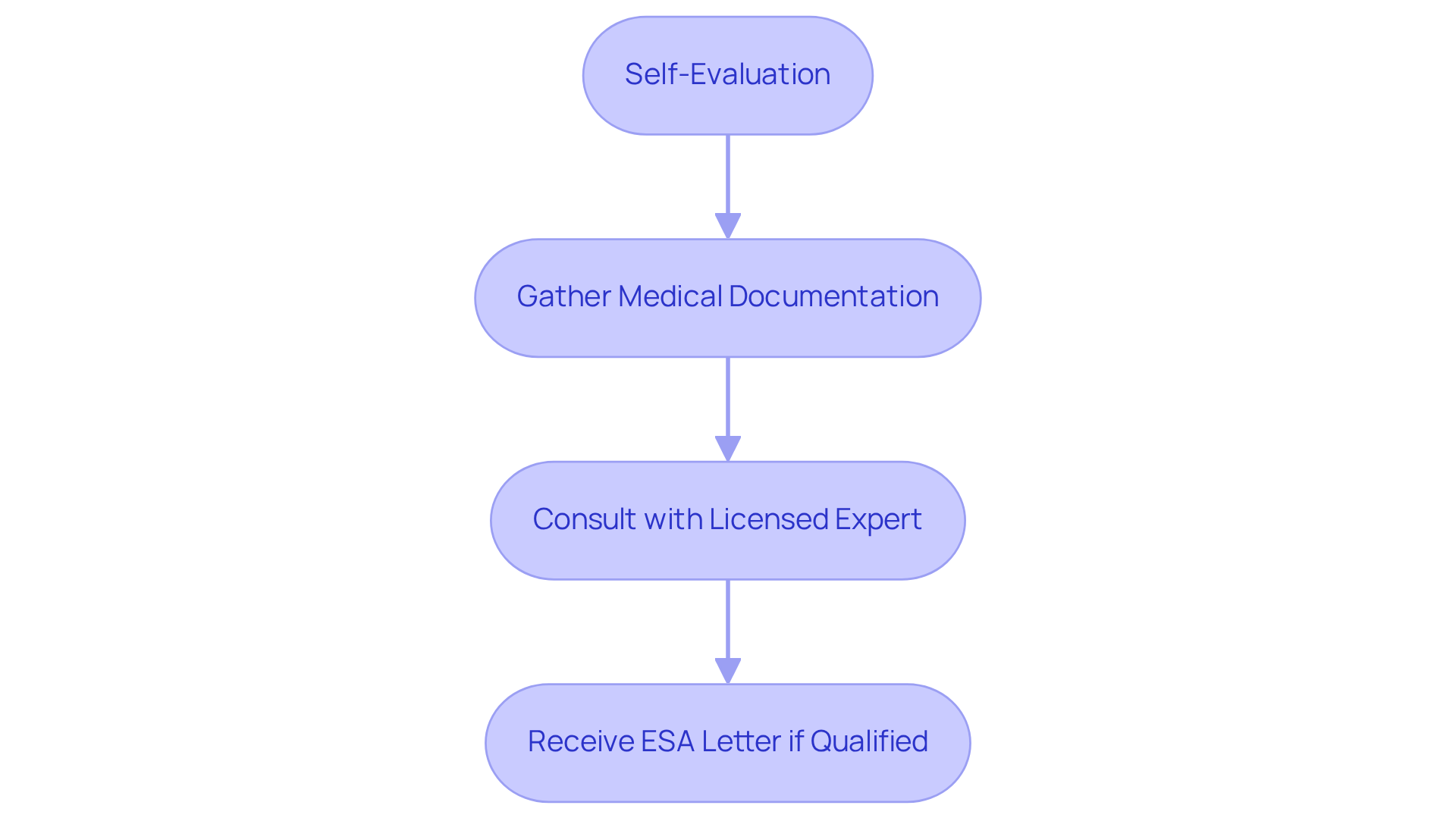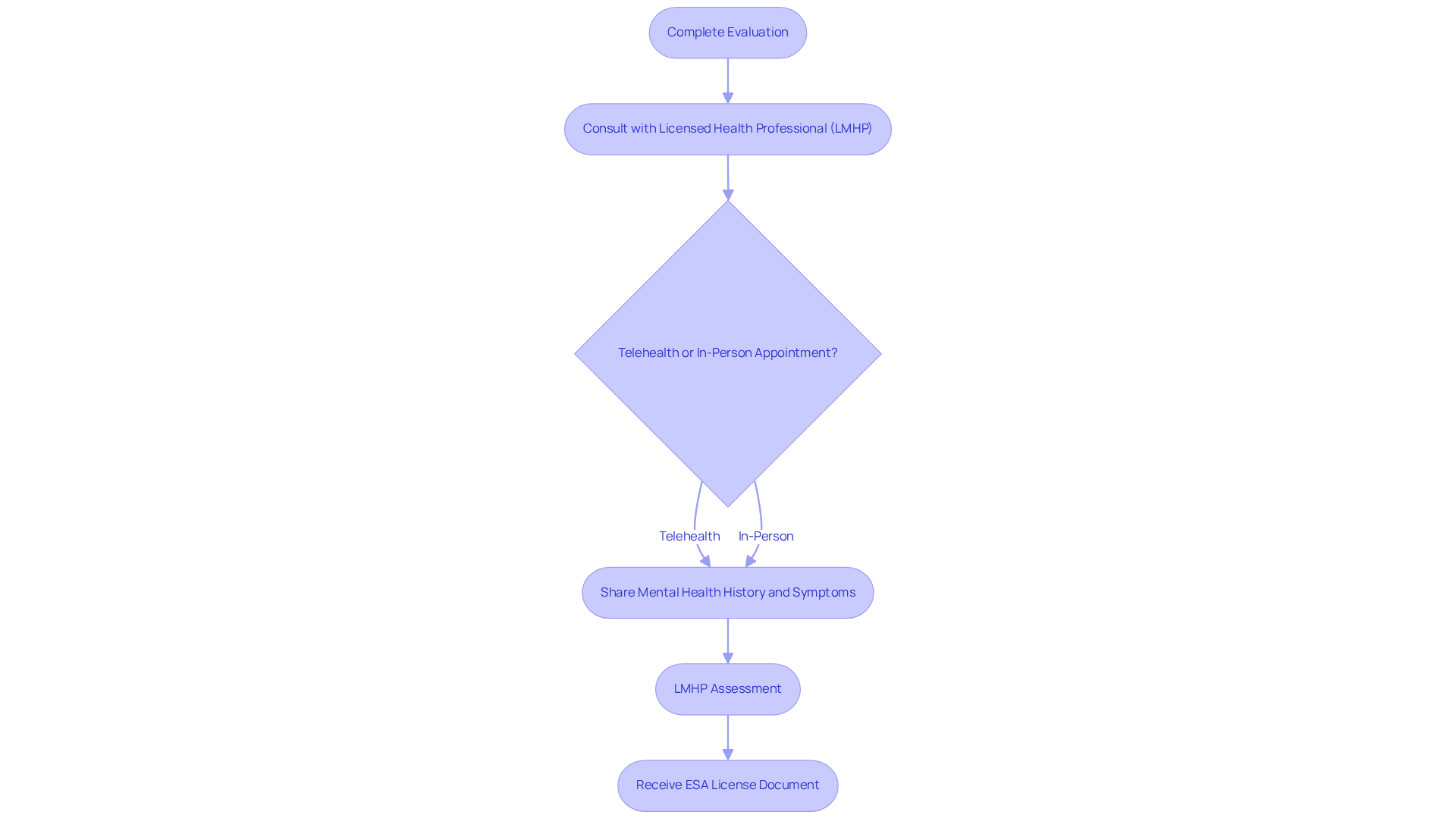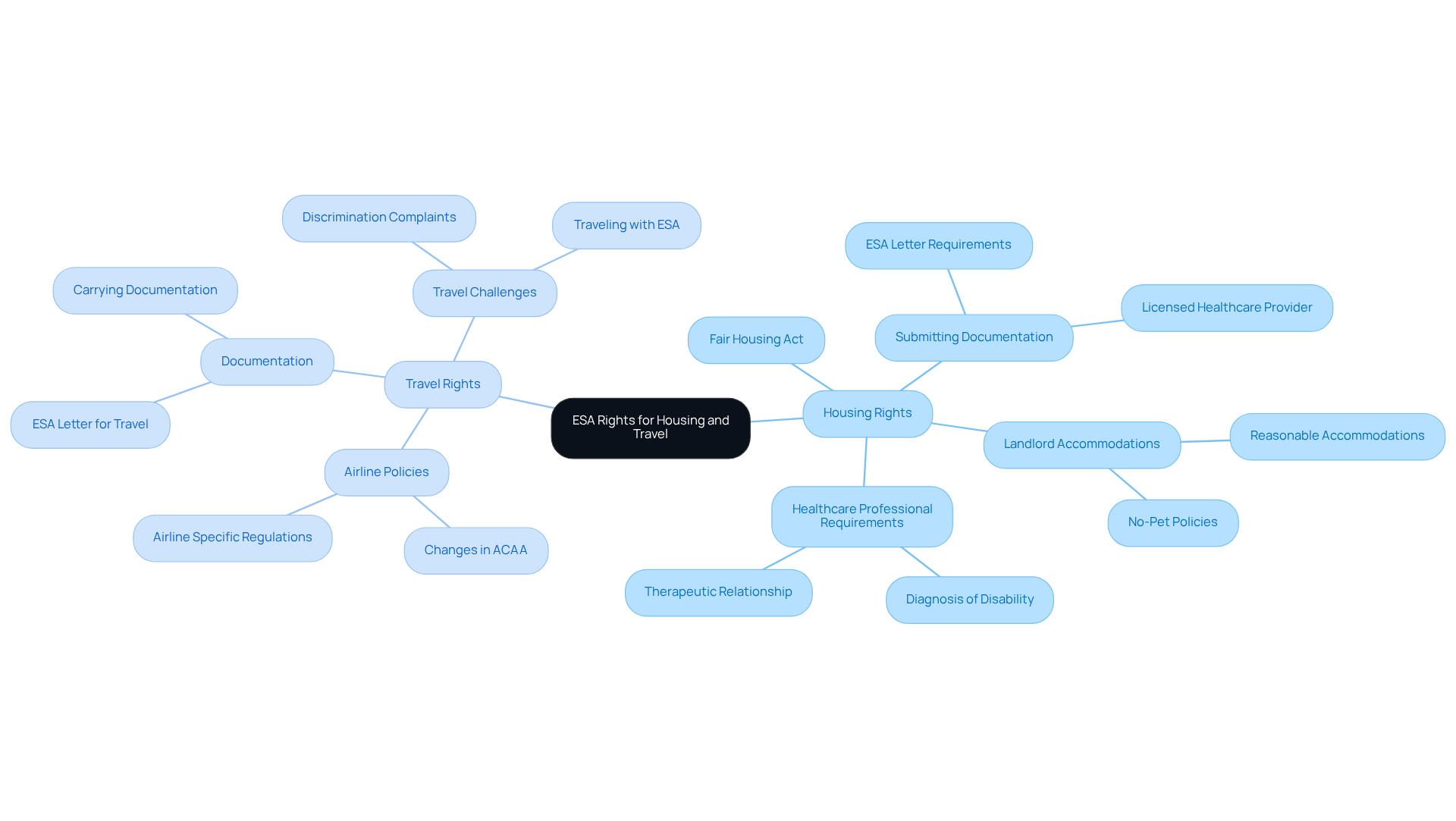

How to Obtain Your Emotional Support Animal License Easily
by Lena Park
Last updated: September 10, 2025
Verified and Approved by:
Angela Morris,
MSW, LCSW
Fact Checked

Overview
Navigating the process to obtain your emotional support animal (ESA) license can feel overwhelming, especially when you’re already facing emotional challenges. It’s essential to first assess your eligibility by consulting with a licensed mental health professional who can provide the necessary documentation. This step is not just a formality; it’s a crucial part of your journey towards finding the support you need.
Many individuals struggle with mental health conditions that can significantly impact their daily lives. A self-evaluation of your mental health is an important starting point, allowing you to gather the medical documentation that will empower you to assert your rights for housing and travel accommodations under relevant laws. This process can be daunting, but remember, you’re not alone in this.
The benefits of having an ESA are profound. These animals can provide comfort and companionship, helping to ease feelings of anxiety and loneliness. By obtaining an ESA letter, you are taking a meaningful step towards enhancing your emotional well-being. It’s a supportive solution that acknowledges your needs and rights.
As you embark on this journey, know that there is support available for you. You deserve to feel cared for and understood, and the process of obtaining your ESA license is a step towards that reassurance. Reflect on your experiences and recognize the importance of having a loving companion by your side as you navigate life’s challenges.
Introduction
The profound impact of emotional support animals (ESAs) on mental health is increasingly recognized, offering solace to those grappling with anxiety, depression, and loneliness. Many individuals face overwhelming emotional challenges that can feel isolating and burdensome. This guide illuminates the essential steps to obtain an ESA license, empowering individuals to access the therapeutic benefits of these compassionate companions.
Imagine having a loving presence by your side, providing comfort in moments of distress. However, the process can often feel daunting—what are the specific eligibility criteria, and how can one navigate the complexities of documentation and legal rights?
Exploring these questions can pave the way for a more fulfilling and supportive living environment, reminding you that help is available and you are not alone in this journey.
Understand Emotional Support Animals and Their Benefits
Support Animals (ESAs) play a vital role in offering comfort and assistance to individuals navigating the complexities of psychological or mental challenges. These animals are not like service animals, which are trained for specific tasks; instead, ESAs primarily provide companionship and emotional stability.
Many people experience feelings of loneliness, anxiety, and depression, and research consistently shows that the presence of an ESA can significantly alleviate these feelings. For instance, studies indicate that interacting with an ESA can lower blood pressure and stress hormones, fostering enhanced psychological health outcomes.
In fact, an impressive 74% of pet owners report improvements in their psychological well-being after welcoming a pet into their lives, highlighting the profound emotional benefits of animal companionship.
It is crucial for individuals considering an emotional support animal license to recognize these advantages, as well as the importance of obtaining the necessary documentation. This documentation not only validates the need for an emotional support animal license but also empowers individuals to assert their rights under housing and travel regulations, fostering a more supportive environment for their overall well-being.
Have you ever felt the weight of loneliness or anxiety? An ESA could be the compassionate companion you need, providing not just comfort but also a sense of belonging.

Assess Your Eligibility for an ESA Letter
To qualify for an emotional support animal license, individuals must navigate the challenges of a psychological health condition that significantly impacts their daily life. Common conditions such as anxiety disorders, depression, and PTSD can create overwhelming emotional burdens. In the U.S., anxiety disorders affect approximately 19% of adults, while depression impacts around 8% of the population, highlighting the prevalence of these issues and the struggles many face.
The initial stage in this journey involves performing a self-evaluation or seeking guidance from a licensed health expert. It’s important to openly discuss your symptoms and how they affect your quality of life. If you believe you meet the criteria, gathering relevant medical documentation that supports your condition will be crucial during your consultation.
Consider the experiences of individuals like Anwyn, who successfully acquired an ESA document while in college. Their story illustrates the emotional support an ESA can offer during challenging academic times. Such experiences underscore the therapeutic benefits of ESAs for those grappling with mental health challenges, reinforcing the importance of this process.
Once you have your documentation, the next step is to consult with a licensed expert who can assess your situation and provide you with the emotional support animal license if you qualify. This document is essential for accessing housing and travel accommodations, particularly in environments where pets are typically restricted, as it serves to obtain an emotional support animal license. Under the Fair Housing Act (FHA), individuals with valid ESA documentation are granted certain rights, including the ability to reside with their ESAs in no-pet housing. While ESAs do not have the same access rights in public spaces as service dogs, they play a crucial role in providing emotional support.
By following these steps, you can effectively evaluate your eligibility for an ESA letter, taking a significant step toward enhancing your emotional well-being. Remember, you are not alone in this journey; support is available to help you navigate these challenges.

Consult with Licensed Professionals to Obtain Your ESA Letter
At Wellness Wag, we understand that navigating mental health challenges can be overwhelming. After completing our brief evaluation, the next step involves a consultation with a licensed health professional (LMHP). This meeting can take place conveniently through our telehealth services or in-person appointments, allowing you to choose what feels best for you. Prepare to share your mental health history, current symptoms, and how an Emotional Support Animal (ESA) can provide comfort and assistance during this time.
The LMHP will thoughtfully assess your needs and, if deemed appropriate, will provide you with an emotional support animal license document tailored to your unique situation. This important document will be printed on the professional’s official letterhead and will include their license number and contact information. Typically, you can expect to receive this document within 24-48 hours. Once you have your emotional support animal license, it’s essential to keep it in a secure place, as you will need it for housing and travel arrangements.
With the increasing availability of telehealth, many individuals have discovered this method to be both effective and efficient. It streamlines the process, allowing you to access the support you need from the comfort of your own home. Remember, you are not alone in this journey, and we are here to support you every step of the way.

Utilize Your ESA Letter for Housing and Travel Rights
With your ESA documentation in hand, you can assert your rights under the Fair Housing Act (FHA) and the Air Carrier Access Act (ACAA). Imagine the relief of being able to present your ESA documentation to your landlord or housing provider, requesting reasonable accommodations like waiving pet fees or allowing your ESA in pet-restricted housing. It’s wise to submit this document early in the leasing process, helping to prevent any complications that might arise later. Under the FHA, landlords are required to accommodate ESA owners, provided they receive proper documentation confirming the need for the animal. This means that if your disability isn’t readily apparent, landlords can request supporting documentation, yet they cannot inquire about the specifics of your disability. Furthermore, the ESA document must be issued by a licensed healthcare professional who understands your condition, ensuring you receive the necessary support from experts, such as those at Wellness Wag, who specialize in support animal therapy.
When it comes to travel, it’s crucial to check with your airline about their specific policies for ESAs, as regulations can vary significantly. As of January 2021, airlines are no longer required to accept support animals as service animals, which means they may treat them as regular pets. Always carry a copy of your ESA letter when traveling; this documentation is vital in advocating for your rights. It’s especially important if you encounter any challenges during your journey. By being informed and prepared, you can ensure that your emotional support animal is by your side in both housing and travel situations, providing the comfort and companionship you need.

Conclusion
Emotional support animals (ESAs) are invaluable companions for those facing mental health challenges, offering comfort and stability that can greatly enhance one’s well-being. It is essential to understand the process of obtaining an emotional support animal license for those seeking to benefit from having an ESA. This not only validates their need for support but also protects their rights in housing and travel situations.
In this guide, we have outlined key steps, including:
- Assessing eligibility for an ESA letter
- Consulting with licensed mental health professionals
- Utilizing the ESA documentation for housing and travel rights
Recognizing the profound emotional benefits of ESAs and navigating the necessary paperwork and legal protections are crucial to ensuring individuals can access the support they truly need.
Ultimately, the journey to obtaining an emotional support animal license transcends mere paperwork; it is about reclaiming a sense of belonging and comfort in everyday life. For those grappling with loneliness, anxiety, or depression, taking these steps can lead to a more fulfilling and supported existence. Embracing the companionship of an ESA can be transformative, making it vital to understand and pursue the necessary documentation to secure these essential benefits.
Frequently Asked Questions
What are emotional support animals (ESAs)?
Emotional support animals (ESAs) are pets that provide companionship and emotional stability to individuals facing psychological or mental challenges. Unlike service animals, ESAs are not trained for specific tasks.
How do ESAs help individuals with mental health issues?
ESAs can significantly alleviate feelings of loneliness, anxiety, and depression. Research shows that interacting with an ESA can lower blood pressure and stress hormones, leading to improved psychological health outcomes.
What percentage of pet owners report improvements in their psychological well-being after getting a pet?
Approximately 74% of pet owners report improvements in their psychological well-being after welcoming a pet into their lives.
Why is it important to obtain documentation for an emotional support animal?
Obtaining the necessary documentation for an emotional support animal is important as it validates the need for an ESA license and helps individuals assert their rights under housing and travel regulations, creating a more supportive environment for their well-being.
Can an ESA provide a sense of belonging?
Yes, an ESA can provide not just comfort but also a sense of belonging, helping individuals cope with feelings of loneliness or anxiety.
Certify Your Emotional Support Animal Today

Why You Can Rely on Us?
At Wellness Wag, we believe your pet deserves care rooted in both science and compassion. Each article is carefully researched, written in clear language for pet owners, and then reviewed by qualified professionals to ensure the information is evidence-based, current, and practical for real-life care. Our goal is to help you feel confident in making informed decisions about your pet’s health and well-being.
Reviewed by
Angela Morris, MSW, LCSW
Angela is a licensed clinical social worker with 20 years of experience in patient advocacy and community mental health. She has assisted numerous clients with ESA evaluations and brings a deep understanding of disability accommodations, ensuring that all information is accurate, supportive, and practical.

Written by :
Lena Park
Last Updated :
September 10, 2025












